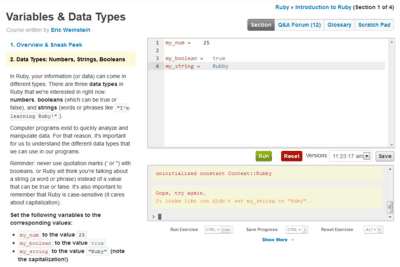| Ruby Track on Codecademy |
| Written by Sue Gee | |||
| Monday, 15 October 2012 | |||
|
Codecademy's latest new track offers a tutorial introducing Ruby, the object-oriented scripting language you can use on its own or as part of the Ruby on Rails web. Like other Codecademy courses, Introduction to Ruby is a "hands-on" course and is aimed at beginners with no previous knowledge of either Ruby or computer science. The first lesson takes you through a series of short exercises which give you instructions as to what to type into an on-screen editor. When you Run your code you see feedback in the lower window. (click to enlarge)
Currently there are five lessons, based on Ruby 1.9.3.:
Each lesson has a project in which you create small programs and this is where learning the language becomes interesting and practical. Again these are broken down into small sections, with between 6 and 8 exercises. The site is sometimes slow, probably due to being overloaded with enthusiastic learners, and does crash with errors from time to time. There is a Q&A forum where students can ask questions and be answered by other students.
So is Ruby a good choice for the beginner? According to Codecademy's announcement: Ruby is currently used at places like Google (for 3D modeling), NASA (for running simulations), and even right here at Codeacademy (as part of the Ruby on Rails web framework). And with its active community of developers and great gem support, it's ideal for building all kinds of useful programs quickly and easily.
In addition to the new Ruby track, Codecademy has also released three new Python units, using Python 2.7, complete with lessons, projects, and challenges.
More Informationhttp://www.codecademy.com/tracks/ruby
Related ArticlesCodecademy Adds Java For Beginners Learn How To Use APIs At Codecademy
Comments
or email your comment to: comments@i-programmer.info
To be informed about new articles on I Programmer, install the I Programmer Toolbar, subscribe to the RSS feed, follow us on, Twitter, Facebook, Google+ or Linkedin, or sign up for our weekly newsletter.
|
|||
| Last Updated ( Saturday, 25 June 2016 ) |




